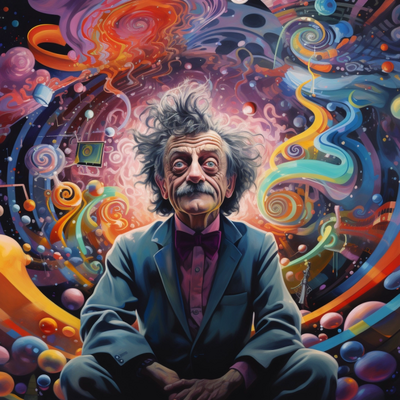«Life is no way to treat an animal.»
Kurt Vonnegut
Kurt Vonnegut (11 November (1922)—†11 April (2007)) is an American writer and a top-favourite author of Fabrice.

Favourite works include the everybody's best-loved Slaughterhouse 5, Cat's cradle and the Sirens of Titan, but one cannot truly enjoy or even understand Vonnegut without reading his other works. Among those, I have special admiration for Breakfast of Champions, Mother Night, Jailbird and God Bless You, Mr. Rosewater. The first book I read was Cat's cradle, c. 2010, which I did not fully understand then. The best first book to read of Vonnegut is probably Slaughterhouse 5 or the Sirens of Titan. I read again Cat's cradle during our Icelandic trip (2024) and it got me crying. I read Deadeye Dick and Galápagos on our long PLMCN25 trip. I read his final book, Timequake, on my Medellin lectures trip. It moved me more than the plane that brought me from one continent to the other over the ocean. What a confession, what intimacy.
Vonnegut is often hailed for his dark humour, but this is missing the point entirely. Humour is in his work only because humour is everywhere of quality regarding human affairs that are deep enough. Vonnegut is really about humanity. His work describes the grip of man against everything that is inhumane: the violent, the ugly, the painful. For this reason, war has a particularly central role in his work, and his success (from Slaughterhouse 5) is largely due to the anti-war sentiment from the then ongoing Vietnam war, but as for the dark humour, war is an accessory or by-product only of his thinking. Vonnegut is much deeper than that. This is also why many of his novels have a science-fiction component. A technically minded person (as he was, having a background in biochemistry), he found the real world too narrow to capture the human spirit and had to stretch in both spiritual, religious and scientific dimensions to get closer to his subject. It is remarkable how he came to distrust machines and a society of robots (already evident from his very first novel, Payer piano). In this sense, Vonnegut belongs with Authors like Bernanos, Giono, Gheorgiu and to a lesser extent, Orwell and Burgess.
Novels[1]
- Player Piano (1952)
 2024
2024 - The Sirens of Titan (1959)
 2018
2018 - Mother Night (1962)

- Cat's Cradle (1963)
 2nd read in August 2024
2nd read in August 2024 - God Bless You, Mr. Rosewater (1965)

- Slaughterhouse-Five (1969)

- Breakfast of Champions (1973)

- Slapstick (1976)

- Jailbird (1979)

- Deadeye Dick (1982)
 7 April 2025
7 April 2025 - Galápagos (1985)
 17 April 2025
17 April 2025 - Bluebeard (1987)
 September 2024
September 2024 - Hocus Pocus (1990)
- Timequake (1997)
Novellas
- God Bless You, Dr. Kevorkian (1999)
Nonfiction
- Canary in a Cat House (1961)
- Wampeters, Foma and Granfalloons (1974)
 October 2024
October 2024 - Palm Sunday (1981)
- Nothing Is Lost Save Honor: Two Essays (1984)
- Fates Worse Than Death (1991)
- Like Shaking Hands with God (1999) Interview
- A Man Without a Country (2005)

Post mortem
- Armageddon in Retrospect the first posthumous collection of his previously unpublished writing, possibly the most important one too
- Kurt Vonnegut: The Cornell Sun Years 1941–1943 (2012)
- We Are What We Pretend To Be (2013) -- compiles his first novella Basic Training and his unfinished (last) novel If God Were Alive Today [1].
- If This Isn't Nice, What Is?: Advice to the Young (2013)
- Vonnegut by the Dozen (2013)
- Kurt Vonnegut: Letters (2014)
- Pity the Reader: On Writing With Style (2019) with Suzanne McConnell
- Love, Kurt: The Vonnegut Love Letters, 1941–1945 (2020) Editor Edith Vonnegut
There is a complete stories collection (that we own), which content is well detailed on the Wikipedia (for instance, it is missing two stories from Welcome to the Monkey House and one from Armageddon in Retrospect, making those necessary to possess in isolation).
References
- ↑ Exist as collected works from the Library of America.
- Ranking of Vonnegut's novels by a fan with an interesting remark regarding Vonnegut's own rating in Palm Sunday, inviting me to such a rating before reading about it.